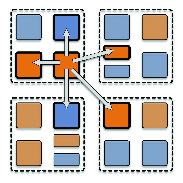David A. Bader is a Distinguished Professor and founder of the
Department of Data Science and inaugural Director of the Institute
for Data Science at New Jersey Institute of Technology. Prior to
this, he served as founding Professor and Chair of the School of
Computational Science and Engineering, College of Computing, at
Georgia Institute of Technology. Dr. Bader is a Fellow of the
IEEE, ACM, AAAS, and SIAM; a recipient of the IEEE Sidney Fernbach
Award; and the 2022 Innovation Hall of Fame inductee of the
University of Maryland’s A. James Clark School of Engineering. He
advises the White House, most recently on the National Strategic
Computing Initiative (NSCI) and Future Advanced Computing
Ecosystem (FACE).
Bader is a leading expert in solving global grand challenges in
science, engineering, computing, and data science. His interests
are at the intersection of high-performance computing and
real-world applications, including cybersecurity, massive-scale
analytics, and computational genomics, and he has co-authored over
300 scholarly papers and has best paper awards from ISC, IEEE
HPEC, and IEEE/ACM SC. Dr. Bader has served as a lead scientist in
several DARPA programs including High Productivity Computing
Systems (HPCS) with IBM, Ubiquitous High Performance Computing
(UHPC) with NVIDIA, Anomaly Detection at Multiple Scales (ADAMS),
Power Efficiency Revolution For Embedded Computing Technologies
(PERFECT), Hierarchical Identify Verify Exploit (HIVE), and
Software-Defined Hardware (SDH).
Recently, Bader received an NVIDIA AI Lab (NVAIL) award, and a
Facebook Research AI Hardware/Software Co-Design award. Dr. Bader
is Editor-in-Chief of the ACM Transactions on Parallel Computing,
and General Co-Chair of IPDPS 2021, and previously served as
Editor-in-Chief of the IEEE Transactions on Parallel and
Distributed Systems. He serves on the leadership team of Northeast
Big Data Innovation Hub as the inaugural chair of the Seed Fund
Steering Committee. ROI-NJ recognized Bader as a technology
influencer on its 2021 inaugural and 2022 lists. In 2012, Bader
was the inaugural recipient of University of Maryland’s Electrical
and Computer Engineering Distinguished Alumni Award. In 2014,
Bader received the Outstanding Senior Faculty Research Award from
Georgia Tech. Bader is a member of Tau Beta Pi (National
Engineering Honor Society), Eta Kappa Nu (Electrical Engineering
Honor Society), and Omicron Delta Kappa (National Leadership Honor
Society). Bader has also served as Director of the
Sony-Toshiba-IBM Center of Competence for the Cell Broadband
Engine Processor and Director of an NVIDIA GPU Center of
Excellence.
In 1998, Bader built the first Linux supercomputer that led to a
high-performance computing (HPC) revolution, and Hyperion Research
estimates that the total economic value of Linux supercomputing
pioneered by Bader has been over $100 trillion over the past 25
years. The Computer History Museum recogizes Bader for developing
the first Linux-based supercomputer which became the predominant
architecture for all major supercomputers in the world. Bader is a
cofounder of the Graph500 List for benchmarking “Big Data”
computing platforms. He is recognized as a “RockStar” of High
Performance Computing by InsideHPC and as HPCwire’s People to
Watch in 2012 and 2014.

